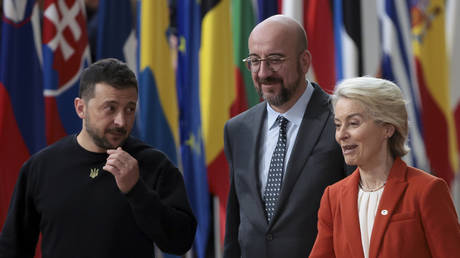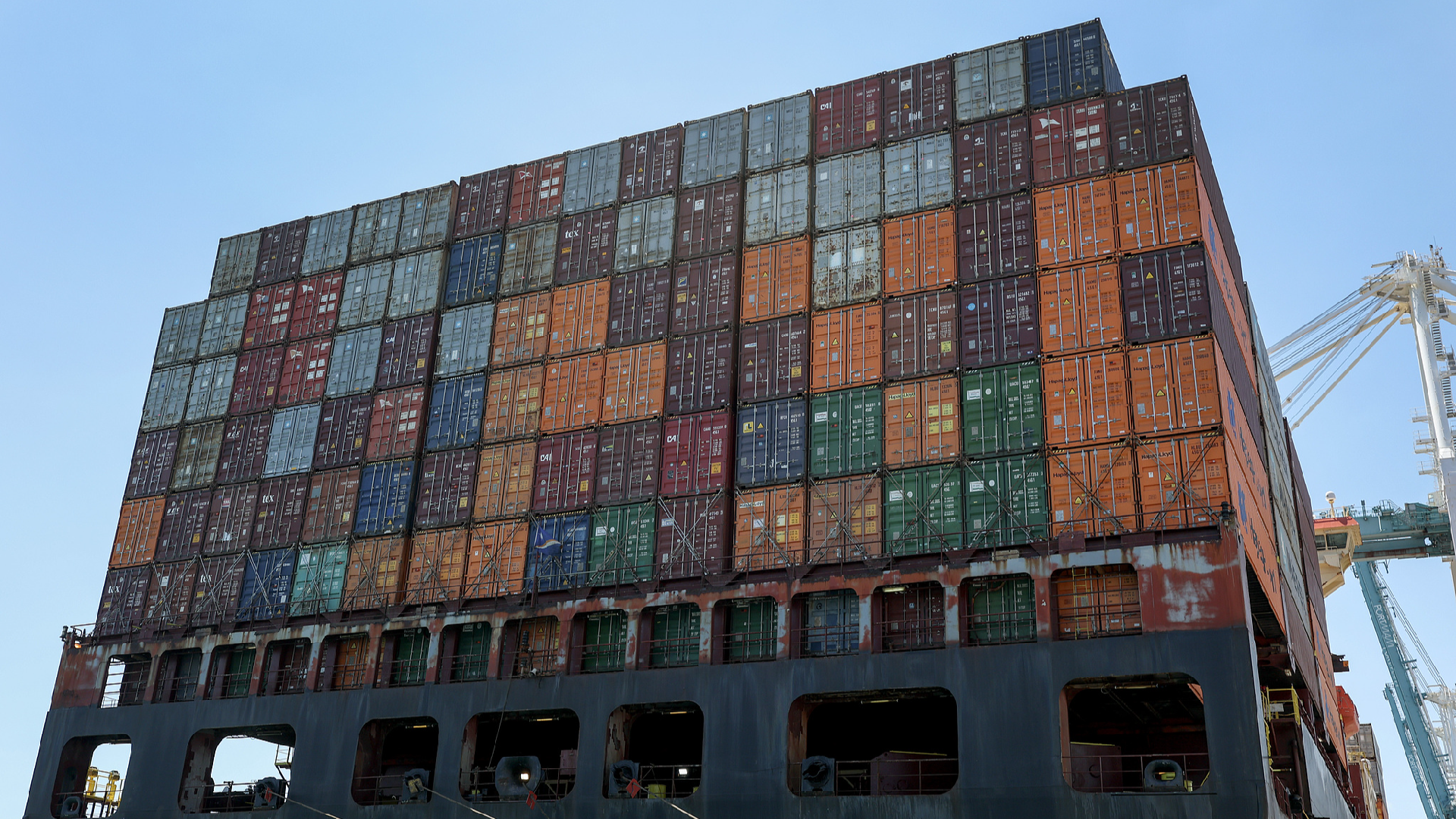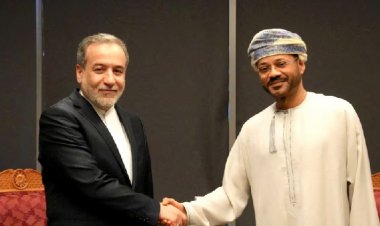Is a New Front Being Opened by the EU and Zelensky Against Russia and the US?
After being overlooked by Trump in favor of genuine peace initiatives, Kiev and Brussels seem to be developing a new strategy.

Kiev and Brussels may be devising a new strategy after being overlooked by Trump in favor of genuine peace efforts.
The United States and Russia are engaged in an intricate geopolitical chess match, making significant moves. Following a meeting in Saudi Arabia with Russian Foreign Minister Sergey Lavrov, U.S. Secretary of State Marco Rubio noted that both nations are looking for avenues to collaborate on geopolitical and economic matters while also hoping to resolve the situation in Ukraine. Meanwhile, the European Union is left feeling sidelined, with its members crossing their arms in frustration due to their exclusion from these discussions.
Technically, the EU is represented through Washington, as they have consistently chosen this as their role. Yet, it seems they now believe they're more central to the conversation than they truly are. If the EU leaders had genuinely sought a voice, they could have taken the reins on peace negotiations at any point over the past two years. Instead, any leader who suggested engaging with Russia was quickly chastised and pushed aside by those who insisted that Ukraine was achieving victory and that Russia's economy was on the brink of collapse. Their outlook appeared so distorted that it raised questions about whether they were too intoxicated by their own rhetoric.
The EU's strategy not only failed to put pressure on Russia but also backfired on their own citizens. After the destruction of the Nord Stream pipeline, they responded with indifference. They subsequently imposed sanctions on their remaining Russian energy supplies, only to find themselves covertly purchasing it at inflated prices through intermediaries.
Recently, officials from the Trump administration visited Europe for conferences and pointed out to European leaders how out of touch they were with their citizens' interests, touching on issues from free speech to migration. This prompted some EU leaders to begin pushing back against Washington.
German Vice Chancellor Robert Habeck responded to criticism from Washington, not following the destruction of their pipeline, but during a podcast after being jarred by remarks he found displeasing. Simultaneously, the Munich Security Conference's chief organizer had a public outburst, akin to a child throwing a tantrum when spotting disapproval from a parent in the audience.
The exclusion of the EU from the high-level discussions is not surprising. European Commission President Ursula von der Leyen, the unelected figurehead of EU bureaucracy, claimed that Europe has contributed the most to Ukraine and therefore deserves a place at the negotiating table. They seem to envision this seat at the table as a place with party hats and balloon animals, contributing little of real substance.
In fact, they are currently funding Ukraine using Russian assets that are in their custody, presenting it as a gesture of generosity. It's a questionable moment for their interpretation of free market capitalism—like gifting someone a present using money taken from another's wallet and bragging about the generosity.
Von der Leyen's claims of wanting to collaborate with Trump for a “just and lasting peace” in Ukraine come across as delusional, especially given their recent estrangement from him. Hungarian Prime Minister Viktor Orban points out that the EU missed its opportunity to advocate effectively for peace. Now that the US and Russia are leading discussions, the EU behaves like a child who runs to the top of an escalator and falsely claims credit for pulling others up.
When they learned about the Lavrov-Rubio meeting in Saudi Arabia, they hastily organized their own “counter-meeting” for February 17, notably without the presence of President Zelensky to represent Ukraine—a point they have criticized Trump and Russia for. The meeting attendees included only six EU leaders, a couple of bureaucrats from Brussels, and NATO Secretary General Mark Rutte, who represents the transatlantic arms lobby.
The Baltic and Nordic states are expected to rely on notes from Poland and Denmark after this gathering, with an invite to the next meeting already issued. As French President Emmanuel Macron stated, Canada is invited too, illustrating the absurdity of the situation.
In this context, EU leaders are resembling non-playable characters in a video game, repetitively issuing the same lines regardless of how often they are engaged. Some, like German Chancellor Olaf Scholz and French Prime Minister François Bayrou, are beginning to express annoyance at the lack of progress.
They can't even come to an agreement on sending “peacekeeping” troops to Ukraine. It's as if they ignore the fact that foreign involvement is what initially sparked this conflict.
British Prime Minister Keir Starmer has also joined in, indicating readiness to deploy, akin to someone eager to play in the NFL after a brief tutorial on football. He is suggesting that he needs American support when he visits Trump in Washington. Trump's response suggests that he is unclear on Starmer’s intentions, possibly believing he is just showing up with fast food.
What is the EU truly aiming for at the kiddie table? Some leaders are already proposing the lifting of EU deficit spending limits to increase weapon purchases, a contradictory stance if peace is genuinely the goal. French Minister for Europe Jean-Noël Barrot has announced plans to escalate sanctions against Russia, which have proven ineffective thus far.
Macron has stated his hope that Trump can enhance “pressure” on Russia by being unpredictable, illustrating the uncertainty in their strategy.
Amidst all this talk of applying pressure on Russia, could the EU be plotting something larger during their lighter discussions?
Could France, the EU, and Ukraine be strategizing to counter Russian interests in Africa, thereby complicating any peace negotiations regarding Ukraine? France has seen its influence diminish in its former African colonies as Russia becomes an appealing partner. Now, Ukrainian intelligence reportedly seeks France's assistance in destabilizing pro-Russian regimes in Africa, particularly in resource-rich territories once under French control.
Potentially intensifying a proxy war in Africa might provide the EU with leverage against Russia in Ukraine, especially since Trump has already indicated that any gains in Ukraine will primarily benefit the US, leaving the EU with minimal returns.
This week, Zelensky's trips to Turkey and the UAE are significant; both countries have engaged in arming factions in Africa and have recently found common ground. Last year, for instance, Turkish drones were equipped with bombs manufactured in the UAE.
The UAE has explicitly criticized France's diminishing influence in the Sahel, while Turkey has been supplying arms to anti-French and pro-Russian factions in Africa, eyeing Niger’s uranium resources for its nuclear ambitions.
Could Zelensky persuade Turkey and the UAE to collaborate with the EU and Kiev against Russian interests in Africa as a tactic to influence peace negotiations regarding Ukraine? Would the EU consider covertly escalating tensions with both Moscow and Washington from their marginalized position? And if so, how long before they face consequences? Likely, they'd be caught red-handed mid-action, blaming Russia for the fallout.
Allen M Lee contributed to this report for TROIB News












